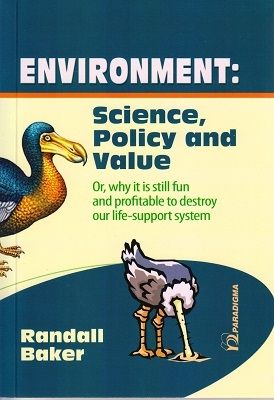Environment: Science, Policy and Value
Цена: 8.00лв.
-
Код:9789543261260
-
Тегло:0.300 кг
When the Chinese say "May you live in interesting times", they are doing you no favors, as this is intended to be a curse. The Chinese Empire, which had survived in one form or another for almost five millennia, put a high premium on stability, to the point where the calligraphy next to the Heavenly Throne read "change nothing".
This, however, is a book about change — rapid and externally induced — that transformed an entire region of the globe more or less coincidental with the tropics and subtropics. It is that process of change that really lies at the heart of this study. In the first place it is difficult to discuss change unless you know what was there to start with. In the context of this book, that involves the interaction of what are now rather patronizingly called "traditional cultures" with the available natural resources their technology enables them to exploit. To discern this interrelationship is difficult since much of the evidence has gone or has been seriously distorted, because much of the written record was provided by biased outsiders, and because the traditional land-use systems were subject to the sudden onslaught of European religion, science, culture, and perception.
The unequal coming together of these two worlds, supposedly "traditional" and "modern", was to totally and irrevocably change the relationship of people and nature, and indeed people and people, across the tropical realm. Now we accept without question that nearly all the poor countries are tropical, but why should this be so? We accept the idea that two people doing the same agricultural task in the tropics and the temperate world command significantly different reward levels for their effort. Why is this? Is it environmentally determined?
The tropics, environmentally and economically, are in trouble, and the only satisfactory way to understand why, and consequently what may be done about this situation, is to study the historical evolution of the changing nature of
environmental management in this part of the world. At the same time we have to recognize that the tropics has no more homogeneity than does the "Third World". However, almost all tropical countries shared a common historical experience of being suddenly separated from the indigenous momentum of their history and being thrown into someone else's back yard. This happened at an absolutely critical time in the history of the colonial powers as they barked on an unprecedented rapid transformation to urban, commercial industrial societies based increasingly on experimental science.
The central thesis of this text is that history and a melding of artificial disciplinary divisions are essential for gaining any real understanding of the environmental tragedy and continuing dilemma of the tropics. This is not an expose of the guilty or a search for blame. It is a journey toward a better understanding of some truly terrible realities.
To achieve this we have to marry some natural science, some anthropology, a lot of history, and indeed anything else that matters. The aim is realism, understanding, and a little humility in the face of some gigantic myths and even more gigantic problems. At the end of the book perhaps we shall know better how to face the future once we know where the present came from.
This, however, is a book about change — rapid and externally induced — that transformed an entire region of the globe more or less coincidental with the tropics and subtropics. It is that process of change that really lies at the heart of this study. In the first place it is difficult to discuss change unless you know what was there to start with. In the context of this book, that involves the interaction of what are now rather patronizingly called "traditional cultures" with the available natural resources their technology enables them to exploit. To discern this interrelationship is difficult since much of the evidence has gone or has been seriously distorted, because much of the written record was provided by biased outsiders, and because the traditional land-use systems were subject to the sudden onslaught of European religion, science, culture, and perception.
The unequal coming together of these two worlds, supposedly "traditional" and "modern", was to totally and irrevocably change the relationship of people and nature, and indeed people and people, across the tropical realm. Now we accept without question that nearly all the poor countries are tropical, but why should this be so? We accept the idea that two people doing the same agricultural task in the tropics and the temperate world command significantly different reward levels for their effort. Why is this? Is it environmentally determined?
The tropics, environmentally and economically, are in trouble, and the only satisfactory way to understand why, and consequently what may be done about this situation, is to study the historical evolution of the changing nature of
environmental management in this part of the world. At the same time we have to recognize that the tropics has no more homogeneity than does the "Third World". However, almost all tropical countries shared a common historical experience of being suddenly separated from the indigenous momentum of their history and being thrown into someone else's back yard. This happened at an absolutely critical time in the history of the colonial powers as they barked on an unprecedented rapid transformation to urban, commercial industrial societies based increasingly on experimental science.
The central thesis of this text is that history and a melding of artificial disciplinary divisions are essential for gaining any real understanding of the environmental tragedy and continuing dilemma of the tropics. This is not an expose of the guilty or a search for blame. It is a journey toward a better understanding of some truly terrible realities.
To achieve this we have to marry some natural science, some anthropology, a lot of history, and indeed anything else that matters. The aim is realism, understanding, and a little humility in the face of some gigantic myths and even more gigantic problems. At the end of the book perhaps we shall know better how to face the future once we know where the present came from.

















